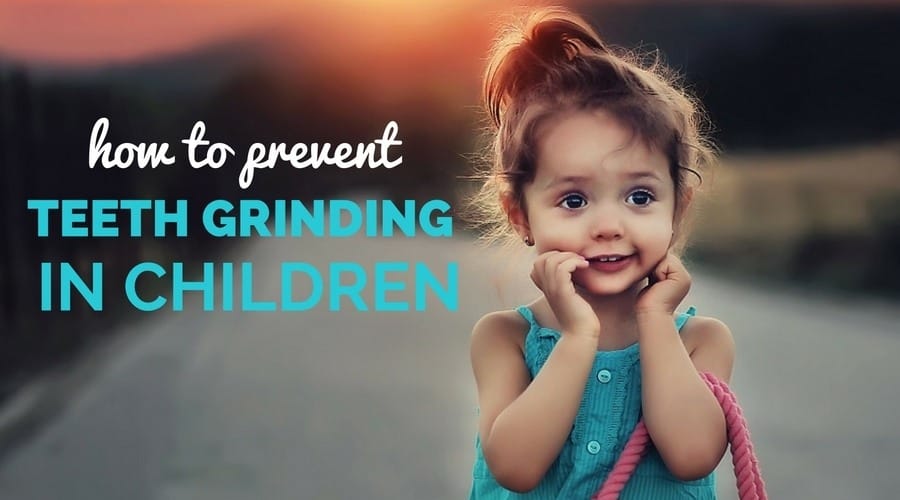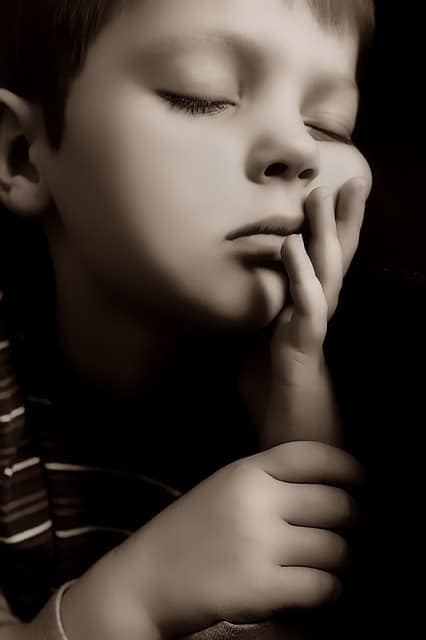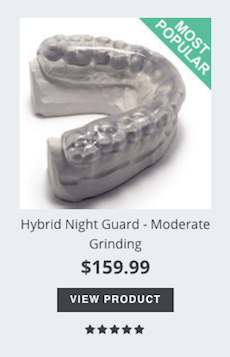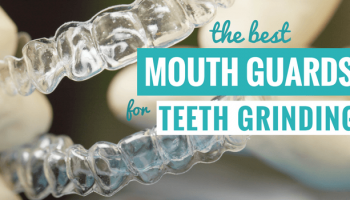
The screeching, gritting sound you hear from your child while he or she is sleeping surely has cost you many a good night’s sleep and have probably made you worry about what exactly is happening to your child.
You may find yourself asking, “Is my child OK? Is this normal – and should I take my child to a dentist? These are common thoughts that fly through the minds of parents everywhere, and such concerns and worries are valid.
After all, how could such a small person make such a loud noise, all while sleeping?
The truth is that teeth grinding in children, otherwise known as “bruxism”, is a very common habit, particularly in children under the age 11. In fact, many dentists are not alarmed by it and some even consider it as normal behavior.
What Causes Teeth Grinding In Children?
Teeth grinding in children can develop for a number of different reasons, including:
- Pain
- Stress or Anxiety
- Hyperactivity
- Cerebral Palsy
- Reaction to Certain Medications
While witnessing teeth grinding in children may startle parents, it’s worth noting that dental care professionals and health experts alike have yet to agree on what exactly causes bruxism, how to treat it and, if it is even necessary to treat it at all.
How Common is Bruxism In Children?
What’s currently known is that around 2-3 out of 10 children have bruxism, so you’re certainly not alone. In fact, some believe this number maybe much higher, given how bruxism can sometimes go unnoticed by parents.
Research has also shown that most children tend to outgrow bruxism, which is good news for worried parents concerned about their kid’s teeth gnashing.
Finding Out If Your Child Has Bruxism
Asking children if they grind their teeth at night doesn’t usually help, mainly because most children don’t even realize that they’re doing it all (neither do many adults, for that matter).
As such, diagnosing if your child actually has bruxism can prove to be particularly difficult. Some strategies for discovering if your child is in fact grinding his or her teeth at night include:
- Monitor Them While They Are Asleep. One way to know is to check on your child at night to see if they’re making grinding noises while they’re asleep. If your child is sleeping with a sibling, the sibling may be able to shed light on your child’s nighttime activity.
- Watch For Jaw Pain. Take note of every time your child complains of pain when chewing, or a sore jaw, as these can also be signs of bruxism.
- Check Your Child’s Teeth. Take a careful look at your child’s teeth. If the teeth all appear to be the same length, or look “flat”, your child may have bruxism. This “flatness” is usually the result of the teeth being worn down from the constant tooth grinding at night.
- Talk To Your Child About Stressors. Try to spend time with your child during the day and talk to him or her. Take the time to find out if your child is worried or angry about something. You may find out that your child is being bullied, that you’ve been pressuring your child too much to do well in school, or that your child is suffering from some other source of stress.
Since children sometimes grind their teeth when anxious or stressed, paying attention to what exactly is causing your child to feel negatively and doing something about it at home, or by seeking professional help, may help stop your child from grinding his or her teeth at night.
Other things to consider when questioning whether or not your children suffers from teeth grinding:
- Genetics. Genetics may also play a key role, as grinding is inheritable. If you or other family members have suffered from bruxism in the past, your child may be more likely to develop teeth grinding.
Statistically, around 70% of the population show some form of bruxism behavior. Even fetuses exhibit bruxing behavior while in the uterus.
The Many Effects of Bruxism On Children
Teeth grinding in children may be fairly common, but there’s no doubt that the effects can be quite troublesome. Dangers of bruxism include:
- Destroying Teeth Enamel. Teeth grinding can potentially wear down the enamel from your child’s teeth, eventually leading to the exposure of the much softer dentine. This then makes it faster for the rest of the tooth to be ground away.
- Lack of Restful Sleep. Teeth grinding is actually classified as a sleep disorder, as it often disrupts an individual’s sleep and may cause your child to wake up in the middle of the night.
- Behavioral Issues. We all know how much children need their sleep. Since it can frequently disturb your child’s sleep, teeth grinding in children can also cause behavioral problems. Clinical studies have demonstrated an association between “wakeful bruxism and anxiety, stress, depression and characteristics of personality”.
- Pain, Headaches & Negative Effect on Quality of Life. Bruxism may also cause headaches, earaches, jaw pain, and damaged teeth in sufferers, regardless of age. Bruxism is also associated with other medical conditions and have been shown to have an impact on quality of life.
Bruxism is also a common complaint among children who breathe through their mouth, and those who suffer from adenotonsillar hypertrophy, obstructive sleep apnea, as well as those with dental occlusions and psychological problems.
It’s also normal for bruxism to go undetected, as many sufferers often show or feel little pain, if at all. In fact, most cases bother other family members more than the actual sufferer because of the annoying sound produced by the constant grinding.
How to Treat Teeth Grinding in Children
The first step for helping to treat your child’s teeth grinding issue is to first check if the grinding is causing any damage.
If the grinding is relatively harmless, you may not need to worry, as some children do tend to outgrow bruxism naturally.
Next, you’ll also need to consider if the grinding is caused by anxiety or stress, in which case treating the underlying cause may prove more effective (both physically and mentally) than simply putting a bandaid over the teeth grinding symptom of stress.
As a safety measure, you should take your child to visit the dentist. There, the dentist will likely prescribe a special night guard for your child – one that’s made specifically for your child’s teeth.
This oral appliance works similar to the protective mouthpieces worn by athletes, but it’s only worn at night and is sophisticated, with advanced customization for your child’s teeth. Wearing one will help protect your child’s teeth from the eventual damage of the constant grinding at night.
Finding Affordable Night Guards to Prevent Teeth Grinding
Often, night guards can be quite expensive, costing anywhere from $400 – $800.  If you can’t afford a visit to the dentist, or if your dentist’s quote for a night guard seems unreasonably high (night guards are rarely covered by insurance), you’ll be relieved to know that there are alternatives.
If you can’t afford a visit to the dentist, or if your dentist’s quote for a night guard seems unreasonably high (night guards are rarely covered by insurance), you’ll be relieved to know that there are alternatives.
There are actually private companies that build custom dental night guards at a fraction of the dentist’s price.
Parents can simply take a mold of their child’s teeth, send the mold directly to a dental lab (bypassing the dentist office fees and surcharges), and receive a custom night guard a few weeks later in the mail.
We recommend Pro Teeth Guard, a trusted company that constructs custom night guards at a price that is 70%-90% less than traditional dentist offices. Plus, they have a 110% guarantee – if you are’t happy with your guard, you get your money back and then some!
Using a combination of close parental observation and frequent dental visits, you can make sure that your child outgrows bruxism so that you no longer have to worry about its many ill effects.
Above all, while teeth grinding is an issue to take seriously and keep an eye on, it’s worth remembering that it’s very common in children and, as a parent, you’re not alone in dealing with this! Use the advice here and your dentist’s recommendations, and your child should be able to resolve his or her teeth grinding issues over time.




I’m a dentist. When I’m examining a child and see that they have worn teeth from grinding, the FIRST thing I check is their throat and tonsils. Most of the time they are enlarged to the point that their airway is obstructed. In my experience, children grind their teeth most often because their breathing is impaired and least often from anxiety, which is what I believe is more a cause in adults.
Really interesting, thanks for sharing Stacey!
Thanks Stacey.My daughter grinds her teeth at night and i was worried sick but at least now i know what causes her to grind-she has got tonsils so we planning on having them removed.On that note,when is the right time to have tonsils removed?
If it is sinus or throat problems. What would you suggest? My daughter and i are constantly allergy sinus. My daughter grinds and i clench my jaw shut…anxiety mainly for me.
Stacey, thanks for the info. It really helped me connect two things – obstruction in my sons left nostril due to which he uses his mouth to breathe at night and teeth grinding. Would you suggest the obstructionto be removed via surgery for a 8 year old? Or shall we wait?